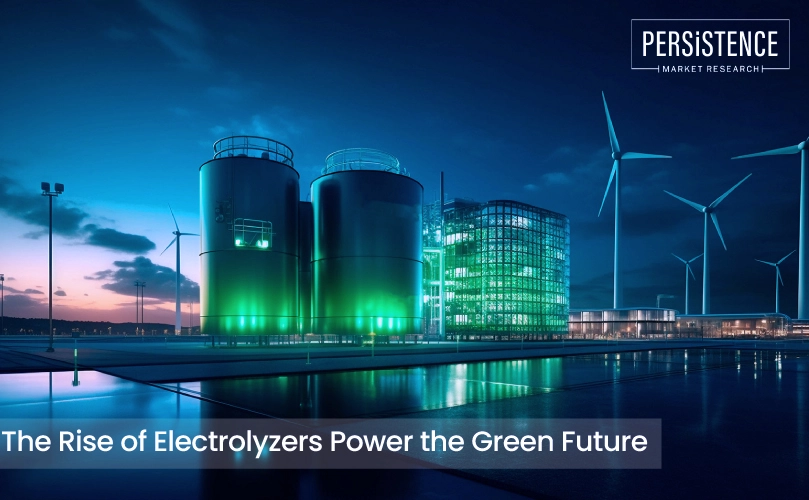The Rise of Electrolyzers Power the Green Future
Published On : Dec 23, 2024
As the global pursuit of sustainability intensifies, electrolyzers have emerged as a cornerstone technology in the transition to green energy. These devices, which use electricity to split water into hydrogen and oxygen, are integral to producing green hydrogen, a renewable, carbon-neutral energy carrier.
Green hydrogen promises transformative impacts across industries such as transportation, energy storage, and manufacturing, aligning with decarbonization goals. Despite their potential, electrolyzers face challenges in scaling up production and adoption, largely due to infrastructure gaps and high costs. However, advancements in electrolyzer technologies and strategic investments indicate a promising trajectory for these tools in shaping a sustainable future.

A Guide to Electrolyzer Technologies and Applications
1. Alkaline Electrolyzers (AEL): These are the most established type, widely used in industrial applications due to their durability and cost-efficiency. Operating at low costs, they utilize a liquid electrolyte, typically potassium hydroxide, and are suited for large-scale hydrogen production.
2. Proton Exchange Membrane (PEM) Electrolyzers: Known for their compact design and ability to handle fluctuating power inputs, PEM electrolyzers are ideal for renewable energy sources like wind and solar. They are gaining traction due to their high efficiency and capability to produce high-purity hydrogen.
3. Solid Oxide Electrolyzers (SOEC): Operating at high temperatures, SOEC systems are highly efficient and can directly utilize heat from industrial processes. While still in the development phase, they are viewed as a potential game-changer for industrial hydrogen production.
4. Anion Exchange Membrane (AEM) Electrolyzers: A relatively new technology, AEM electrolyzers aim to combine the cost benefits of alkaline systems with the performance advantages of PEM electrolyzers.
Each type serves specific applications, and advancements are ongoing to optimize their efficiency, cost, and scalability. Notably, projects integrating electrolyzers with solar and wind farms are becoming increasingly common, emphasizing their role in renewable energy systems.
The Electrolyzer Market Remains a Catalyst for Sustainable Growth
The global market for electrolyzers is driven by ambitious decarbonization goals and a surge in green hydrogen projects. Governments and corporations are setting ambitious hydrogen production targets to mitigate climate change. For example, the U.S. Department of Energy aims to produce 10 million tons of clean hydrogen annually by 2030 and 50 million tons by 2050. Similarly, the European Union has announced plans to install 40 GW of electrolyzer capacity by 2030.
Renewable energy integration is another key driver. Electrolyzers offer a solution to store surplus electricity from renewables, converting it into hydrogen that can be stored and later used. Moreover, industrial sectors such as steel, cement, and chemicals are exploring hydrogen as a cleaner alternative to fossil fuels. Notable projects, such as the Ningxia Solar Hydrogen Project in China, underscore the growing scale of electrolyzer deployments.
Top 5 Electrolyzer Companies Leading the Charge
1. Nel ASA: Based in Norway, Nel specializes in both alkaline and PEM electrolyzers. Its flagship projects include green hydrogen plants in Europe, contributing to decarbonization in industrial and transportation sectors.
2. ITM Power: A UK-based company, ITM Power focuses on PEM technology. The company has partnered with Shell to develop hydrogen refueling stations and supports renewable energy projects across Europe.
3. McPhy Energy: A French firm known for its advanced alkaline electrolyzers, McPhy is involved in large-scale hydrogen initiatives like the "Gigafactory" project, which aims to expand manufacturing capacity to meet growing demand.
4. Siemens Energy: Siemens has developed PEM electrolyzers tailored for integration with renewable energy sources. Its Silyzer series is deployed in numerous green hydrogen projects worldwide.
5. Plug Power: Based in the United States, Plug Power is a leader in PEM electrolyzers. The company is advancing hydrogen infrastructure, particularly in North America, and is involved in the construction of hydrogen production hubs.
Addressing the Key Hurdles to Widespread Electrolyzer Deployment
- High Costs: The initial investment and operational costs of electrolyzers are significant. Scaling production and advancing technology are critical to reducing these costs.
- Infrastructure Limitations: A lack of hydrogen transport and storage infrastructure hinders the widespread adoption of green hydrogen.
- Regulatory Uncertainty: Variability in global policies and standards for hydrogen production and use poses challenges to market stability and growth.
- Material Dependency: Some electrolyzers rely on rare or expensive materials, like platinum and iridium in PEM systems, necessitating research into alternative materials.
To overcome these challenges, collaboration across industries and governments is essential. For instance, initiatives like the Hydrogen Council are fostering partnerships to develop infrastructure and drive innovation. The integration of hydrogen with carbon capture technologies and advancements in SOEC systems also hold promise for enhancing efficiency and scalability.
Electrolyzers Work as a Key to Clean Energy Transition
Electrolyzers are at the forefront of the green energy revolution, providing a versatile solution to produce hydrogen for diverse applications. Their role in decarbonizing industries, enhancing energy security, and fostering economic growth cannot be overstated. As governments and industries align their efforts to scale production and address challenges, the path toward a hydrogen-powered future becomes increasingly clear. The continued innovation and commitment to sustainability will determine the pace and extent of this transformative journey.
Hydrogen Electrolyzer Market: Global Industry Analysis and Forecast, 2016-2026
View ReportLatest Reports
-
Global Market Study on Automated Blinds and Shades: Integration of Blinds & Shades with Smart Home Systems to Stimulate Market Growth
-
Global Market Study on Lavender Oil: Rising Awareness about Benefits of Lavender Oils on Human Health to Gain Momentum in the Upcoming Years
-
Global Market Study on Bulgur Market: Buoyant Demand in Household sector driving the Market Growth
-
Global Market Study on Thermoplastic Decorative Films: Propylene Films to Remain Widely Used across Sectors
-
Europe Market Study on Lithium-Ion Battery: High Preference for Phosphate Batteries to Be Witnessed
Hydrogen Electrolyzer Market
Research Designed to Meet your Specific Needs